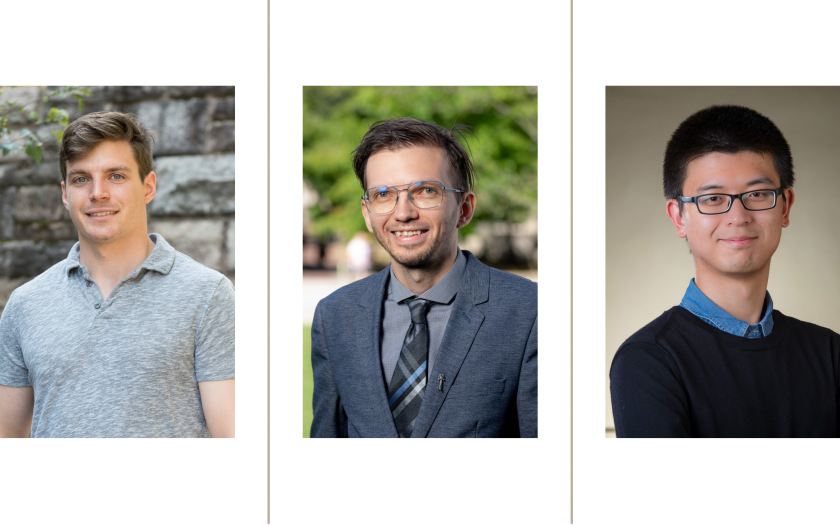3 PhD Theses Defended Summer 2022

(left to right) Dr. Christopher Black, Dr. Dmitrijs Celinskis, Dr. Minglang Yin
Christopher Black, PhD
Borton Lab
Investigating Neural Correlates of Nociception in Primary Somatosensory Cortex Using Novel Behavioral Methods
- Black, C., Darie, R., & Borton, D. (2018). Organic Electronics for Artificial Touch. Trends in neurosciences, 41(9), 568–570. https://doi.org/10.1016/j.tins.2018.07.010
- Black, C. J., Allawala, A. B., Bloye, K., Vanent, K. N., Edhi, M. M., Saab, C. Y., & Borton, D. A. (2020). Automated and rapid self-report of nociception in transgenic mice. Scientific reports, 10(1), 13215. https://doi.org/10.1038/s41598-020-70028-8
Chris has been such a wonderful person to work with and learn from. His research entailed building a better understanding of sensory and pain processing using neurophysiological tools and developing computational models to complement his experimental approach. He has always taken the extra step to help or mentor anybody that has needed it, share resources, feedback or crack the occasional (bad) joke to lighten the mood. He will be missed very much and we wish him the best of luck on his next big adventure which he will inevitably excel at! -Borton Lab
Dmitrijs Celinskis, PhD
Borton Lab
Multi-site and Multi-modal Imaging Methods for Studying Spinal, Brain, and Vascular Dynamics
- Celinskis, D., Friedman, N., Koksharov, M., Murphy, J., Gomez-Ramirez, M., Borton, D., Shaner, N., Hochgeschwender, U., Lipscombe, D., & Moore, C. (2020). Miniaturized Devices for Bioluminescence Imaging in Freely Behaving Animals. Annual International Conference of the IEEE Engineering in Medicine and Biology Society. IEEE Engineering in Medicine and Biology Society. Annual International Conference, 2020, 4385–4389. https://doi.org/10.1109/EMBC44109.2020.9175375
Dmitrijs’ efforts within the lab have been nothing short of heroic. From developing novel methods and tools for simultaneously recording neural and vascular activity in the brain and spinal cord to optimizing miniaturized microscopes for bioluminescence imaging, Dmitrijs has been revolutionizing the way in which neuroscientists are able to study the complex biological activity inherent to the nervous system. His ability to tackle such challenging problems are easily attributed to his work ethic, enthusiasm, and inquisitiveness. Despite the late nights and long hours required to accomplish such goals, Dmitrijs has always taken the time to serve as an incredible friend and mentor to anyone passing through Carney and MRL. We have all been fortunate not only to see him perform outstanding research, but also to learn from him throughout his doctoral endeavors. Well-deserved and congratulations! -Borton Lab
Minglang Yin, PhD
Karniadakis Lab
Hybrid Computational-Machine Learning Models with Uncertainty Quantification for Aortic Dissection
- Yin, M., Ban, E., Rego, B. V., Zhang, E., Cavinato, C., Humphrey, J. D., & Em Karniadakis, G. (2022). Simulating progressive intramural damage leading to aortic dissection using DeepONet: an operator–regression neural network. Journal of the Royal Society Interface, 19(187), 20210670.
- Cai, S., Mao, Z., Wang, Z., Yin, M., & Karniadakis, G. E. (2022). Physics-informed neural networks (PINNs) for fluid mechanics: A review. Acta Mechanica Sinica, 1-12.
- Yin, M., Zhang, E., Yu, Y., & Karniadakis, G. E. (2022). Interfacing finite elements with deep neural operators for fast multiscale modeling of mechanics problems. Computer Methods in Applied Mechanics and Engineering, 115027.
- Goswami, S., Yin, M., Yu, Y., & Karniadakis, G. E. (2022). A physics-informed variational DeepONet for predicting crack path in quasi-brittle materials. Computer Methods in Applied Mechanics and Engineering, 391, 114587.
- Yin, M., Zheng, X., Humphrey, J. D., & Karniadakis, G. E. (2021). Non-invasive inference of thrombus material properties with physics-informed neural networks. Computer Methods in Applied Mechanics and Engineering, 375, 113603.
- Blumers, A. L., Yin, M., Nakajima, H., Hasegawa, Y., Li, Z., & Karniadakis, G. E. (2021). Multiscale parareal algorithm for long-time mesoscopic simulations of microvascular blood flow in zebrafish. Computational Mechanics, 68(5), 1131-1152.
Minglang joined CRUNCH group in 2017 as a master student, and later on he joined the Center for Biomedical Engineering as a PhD student. Over the years, he has dedicated himself to interdisciplinary research on machine learning, computational mechanics, and biomedical engineering. Using advanced computational methods, he tackled complicated problems related to aortic dissections. He was also interested in developing novel computational methods of general interest for the engineering community. With a strong motivation for research, he will pursue a postdoc in the Department of Biomedical Engineering at Johns Hopkins University. Minglang is a creative and hard-working researcher, a fantastic collaborator, and an intimate friend to me and many others in the CRUNCH group. Minglang, wish you great success in your research career! -Enrui Zhang